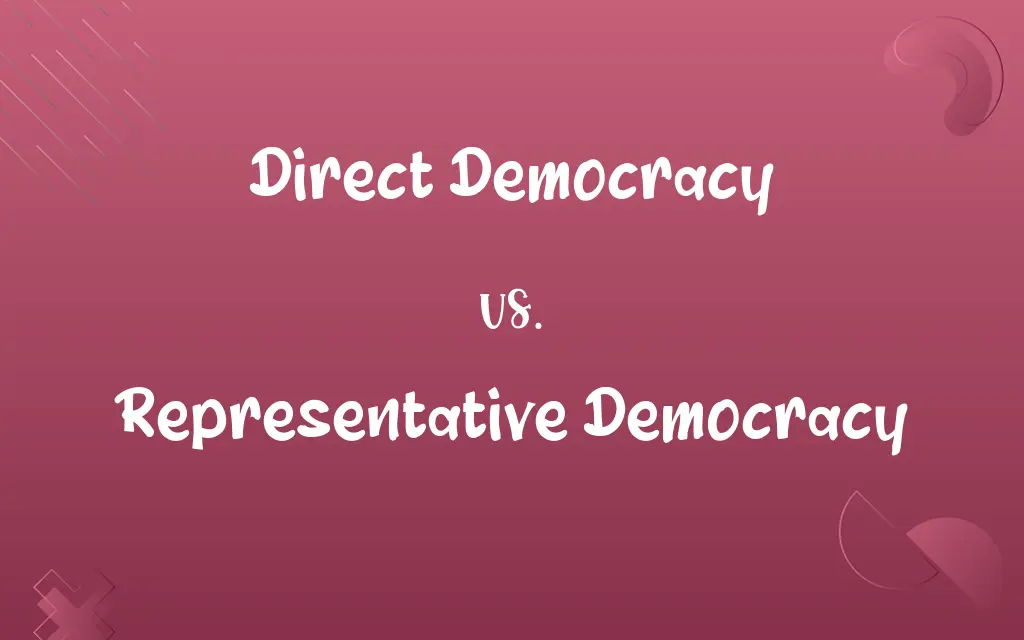Direct Democracy vs. Representative Democracy: Know the Difference

By Hifza Nasir & Dua Fatima || Published on September 13, 2024
Direct democracy involves citizens voting on laws directly, while representative democracy elects officials to make decisions on their behalf, emphasizing participation vs. delegation.

Key Differences
Direct democracy allows for the direct participation of citizens in the decision-making process, where they vote on laws and policies themselves. This form of governance is rooted in the idea that all citizens should have an equal say in the decisions that affect their lives. Representative democracy, on the other hand, involves the election of officials who make decisions on behalf of the people. This system is based on the belief that elected representatives can effectively understand and advocate for the interests of their constituents.
Dua Fatima
Sep 13, 2024
Direct democracy offers a high level of citizen engagement and ensures that the will of the majority is reflected in government decisions, it can be impractical for large populations or complex issues. Representative democracy, in contrast, is more scalable and allows for the delegation of decision-making to individuals who are (ideally) knowledgeable and capable of handling complex matters. However, it also introduces the risk of elected officials not accurately representing the interests of their constituents.
Hifza Nasir
Sep 13, 2024
Direct democracy is often implemented in the form of referendums or initiatives, where specific issues are put to a vote by the entire electorate. This approach can empower citizens and increase engagement with political processes. Representative democracy, however, operates through a structured legislative system, where elected officials debate and decide on laws within a parliamentary or congressional framework. This system can streamline decision-making and provide stability.
Hifza Nasir
Sep 13, 2024
One of the challenges of direct democracy is the potential for the tyranny of the majority, where the rights of minority groups can be overridden by the majority vote. Representative democracy aims to mitigate this risk through the establishment of checks and balances and the protection of minority rights within the legislative process. However, this system can also lead to a disconnect between the electorate and their representatives, potentially diminishing public trust in government.
Shumaila Saeed
Sep 13, 2024
Despite their differences, both direct and representative democracies strive to embody the principle of the sovereignty of the people. The choice between them often reflects a balance between the desire for direct public participation and the need for efficient governance in a complex society.
Shumaila Saeed
Sep 13, 2024
ADVERTISEMENT
Comparison Chart
Definition
Citizens vote directly on laws.
Citizens elect officials to make decisions.
Hifza Nasir
Sep 13, 2024
Participation
High, with direct involvement.
Indirect, through elected representatives.
Dua Fatima
Sep 13, 2024
Scalability
Challenging for large populations.
More practical for large societies.
Hifza Nasir
Sep 13, 2024
Decision-making complexity
Limited by citizens' expertise.
Delegated to knowledgeable officials.
Dua Fatima
Sep 13, 2024
Protection of minority rights
Risk of tyranny of majority.
Checks and balances aim to protect minorities.
Shumaila Saeed
Sep 13, 2024
ADVERTISEMENT
Direct Democracy and Representative Democracy Definitions
Direct Democracy
Relies on the principle of majority rule.
In direct democracy, the majority's decision on a referendum is final.
Hifza Nasir
Feb 27, 2024
Representative Democracy
Designed to represent the electorate's interests.
In a representative democracy, elected officials are expected to advocate for their constituents' needs.
Dua Fatima
Feb 27, 2024
Direct Democracy
A system where citizens vote on laws directly.
In a direct democracy, a referendum might determine a new law's fate.
Dua Fatima
Feb 27, 2024
Representative Democracy
Allows for specialized decision-making.
Representative democracy delegates complex policy decisions to elected experts.
Hifza Nasir
Feb 27, 2024
Direct Democracy
Can lead to high civic engagement.
Direct democracy initiatives increase public participation in political processes.
Shumaila Saeed
Feb 27, 2024
ADVERTISEMENT
Representative Democracy
Can suffer from a disconnect between elected officials and the electorate.
In some cases, representative democracy experiences gaps in representing public sentiment accurately.
Dua Fatima
Feb 27, 2024
Direct Democracy
Faces challenges in large and diverse societies.
Implementing direct democracy is complex in a country with millions of citizens.
Hifza Nasir
Feb 27, 2024
Representative Democracy
A governance system electing officials to make decisions.
Representative democracy enables citizens to choose their lawmakers.
Dua Fatima
Feb 27, 2024
Direct Democracy
Empowers individuals to have a direct say in governance.
Direct democracy allows every citizen to vote on critical national issues.
Hifza Nasir
Feb 27, 2024
Representative Democracy
Includes mechanisms to protect minority rights.
Representative democracy establishes checks and balances to safeguard against majority tyranny.
Hifza Nasir
Feb 27, 2024
Repeatedly Asked Queries
What is representative democracy?
Representative democracy is a system where citizens elect officials to make governmental decisions on their behalf.
Dua Fatima
Sep 13, 2024
How does direct democracy work?
In direct democracy, proposals are put to a public vote, and the majority decision determines the outcome.
Hifza Nasir
Sep 13, 2024
What are the advantages of direct democracy?
It ensures direct public involvement in decision-making and reflects the majority's will accurately.
Hifza Nasir
Sep 13, 2024
What is direct democracy?
Direct democracy is a form of government where citizens vote on laws and policies directly, without intermediaries.
Dua Fatima
Sep 13, 2024
What are the disadvantages of direct democracy?
It can be impractical for large societies and risks overlooking minority rights.
Dua Fatima
Sep 13, 2024
How does representative democracy work?
In representative democracy, elected representatives make decisions based on the interests and will of the people they represent.
Dua Fatima
Sep 13, 2024
What is a referendum?
A referendum is a direct vote in which an electorate is asked to either accept or reject a particular proposal.
Hifza Nasir
Sep 13, 2024
What are the disadvantages of representative democracy?
There can be a disconnect between elected officials and the electorate, and it may not always accurately reflect public will.
Hifza Nasir
Sep 13, 2024
Can direct democracy and representative democracy coexist?
Yes, many representative democracies incorporate elements of direct democracy, such as referendums and initiatives.
Hifza Nasir
Sep 13, 2024
What are the advantages of representative democracy?
It is more practical for larger populations and allows for specialized decision-making by knowledgeable officials.
Hifza Nasir
Sep 13, 2024
Is direct democracy feasible in large countries?
While challenging, some large countries incorporate direct democracy features for specific decisions.
Hifza Nasir
Sep 13, 2024
How do representative democracies protect minority rights?
Through checks and balances, constitutional protections, and sometimes specific legislative measures.
Shumaila Saeed
Sep 13, 2024
What role do citizens play in a representative democracy?
Citizens vote in elections, engage in political dialogue, and can participate in civic activities.
Dua Fatima
Sep 13, 2024
Can the decision-making process in direct democracy be efficient?
It can be efficient for straightforward issues but may become cumbersome for complex or technical matters.
Hifza Nasir
Sep 13, 2024
How are representatives chosen in a representative democracy?
Through elections, where citizens vote for candidates or parties that best represent their interests.
Hifza Nasir
Sep 13, 2024
Share this page
Link for your blog / website
HTML
Link to share via messenger
About Author
Written by
Hifza NasirCo-written by
Dua Fatima








































































